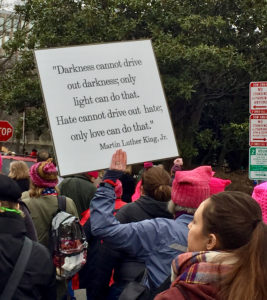 I ran into someone the other day who had just returned from the Women’s March in Washington and she had with her a poster from the march. As she unrolled it to show me she said, “I’m so glad I was there. I’m going to put this poster in a safe place so my granddaughter can have it one day!”
I ran into someone the other day who had just returned from the Women’s March in Washington and she had with her a poster from the march. As she unrolled it to show me she said, “I’m so glad I was there. I’m going to put this poster in a safe place so my granddaughter can have it one day!”
I know exactly how she feels. I spent most of Saturday down on the National Mall with about 500,000 other people (depending on who you ask). I’m glad I made the trip to Washington, because after a week of highs and lows for many in America just the act of being there gave me hope for the democratic process and for the future of humanity in general.
And I was especially glad my kids attended with me, as I figure they are the ones who will inherit whatever mess we make. Every time I look at the pictures of pink hats flooding DC I’m proud to say, “I was part of that.”
I expect a lot of other participants in marches all over the world feel the same way I did. We came out to march in what was a powerful message to our new president. We came out to march for our kids and for ourselves and for the future we hope for. But not everyone understands that. Many people have asked — some genuinely trying to understand — why so many women and men poured into the streets in cities across our country and the world. What was the point?
If the only reason we marched was so that our kids could someday find our pink hats and protest signs when they clean out our attics, then it does seem to be a lot of wasted energy. Because the truth is, it’s not what millions of us did on Saturday that is going to change our world. What will really shape the future for ourselves and for our children are the actions we take each and every day in the months and years to come.
 If we really care about the issues for which we marched — the rights of women and LGBTQ folks, racism in our country, the just treatment of immigrants, and so many more — it’s time to think hard about how we will use our pink hats and protest signs in the next four years. Insubstantial outrage might feel exciting for a little while, but it will exhaust us before too long.
If we really care about the issues for which we marched — the rights of women and LGBTQ folks, racism in our country, the just treatment of immigrants, and so many more — it’s time to think hard about how we will use our pink hats and protest signs in the next four years. Insubstantial outrage might feel exciting for a little while, but it will exhaust us before too long.
Every person in the streets this weekend will have to articulate for themselves how they will continue to work for justice and peace. But for those of us who are Christian and marched or protested because of our faith, here are three guidelines that might help guide our actions.
First, everything we say or do should be grounded in the gospel of Jesus Christ. This means that we reflect the qualities Jesus taught us, and it also means we are not shy about saying who we are and why we speak or act.
Second, we must engage in prophetic witness. This means we will not be afraid to speak the truth out loud, to say things that might be controversial, to advocate with and for those who cannot speak or advocate for themselves.
Third, we should always work to offer ourselves in relationship that moves us toward reconciliation. This means that everything we say or do should help us engage in relationship with others, especially those who are different than we are. So we tell stories of real life, we listen to the voices of others, we reach out to each other and to a world of different people with different perspectives, believing that relationships change us.
There’s much to be fixed in our country, and that’s not an alternative fact. There is a time and place to take to the streets. But when the crowds have gone home, and the cameras are put away, that is when our real work begins. Will we live what we say we believe? Will we speak and act with conviction, defending those who are most vulnerable while never denying the full humanity of any? If we do, then maybe one day we can look back on a world we have made a little more kind, a little more just, and we can tell our grandkids: “I was part of that.”
